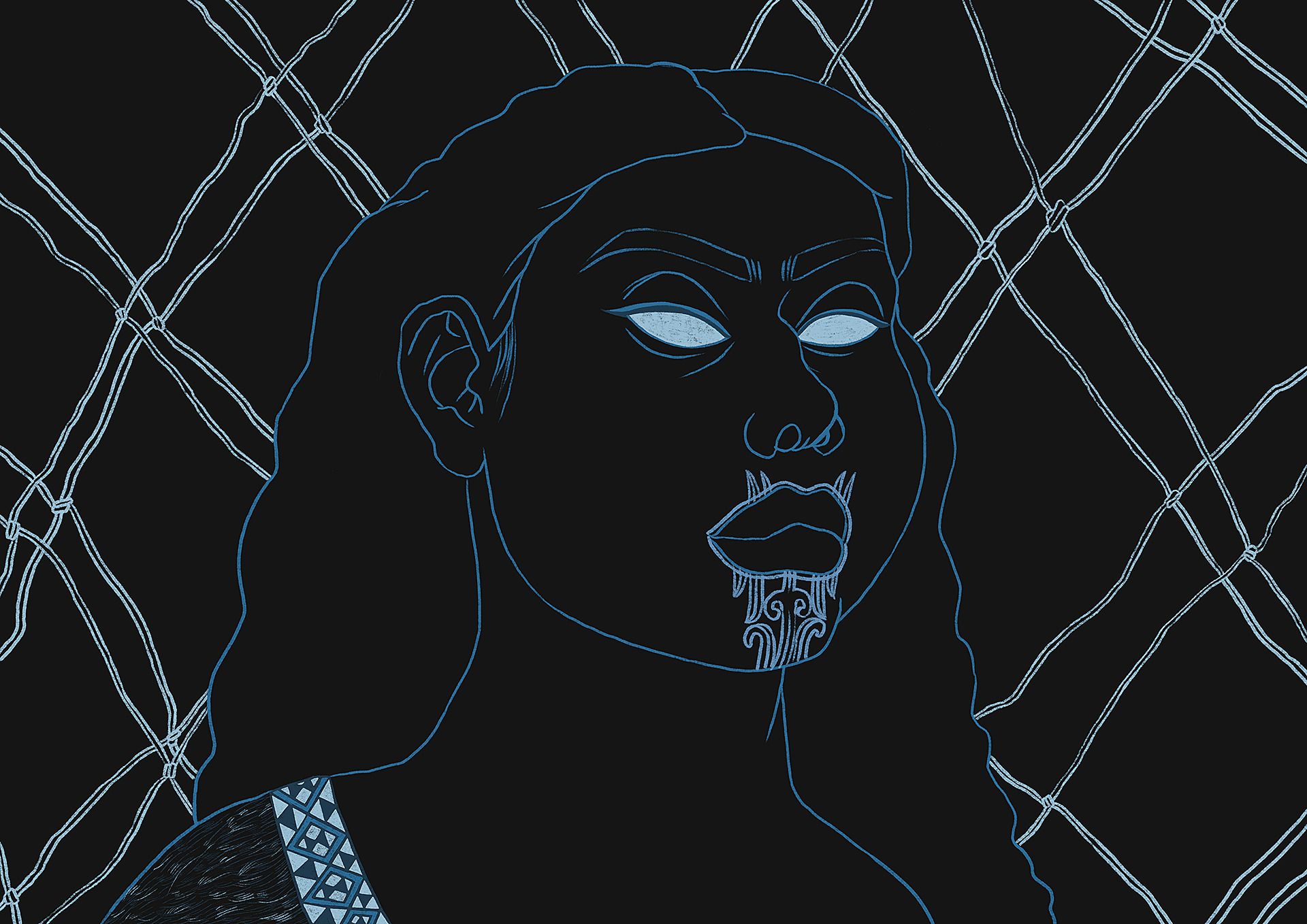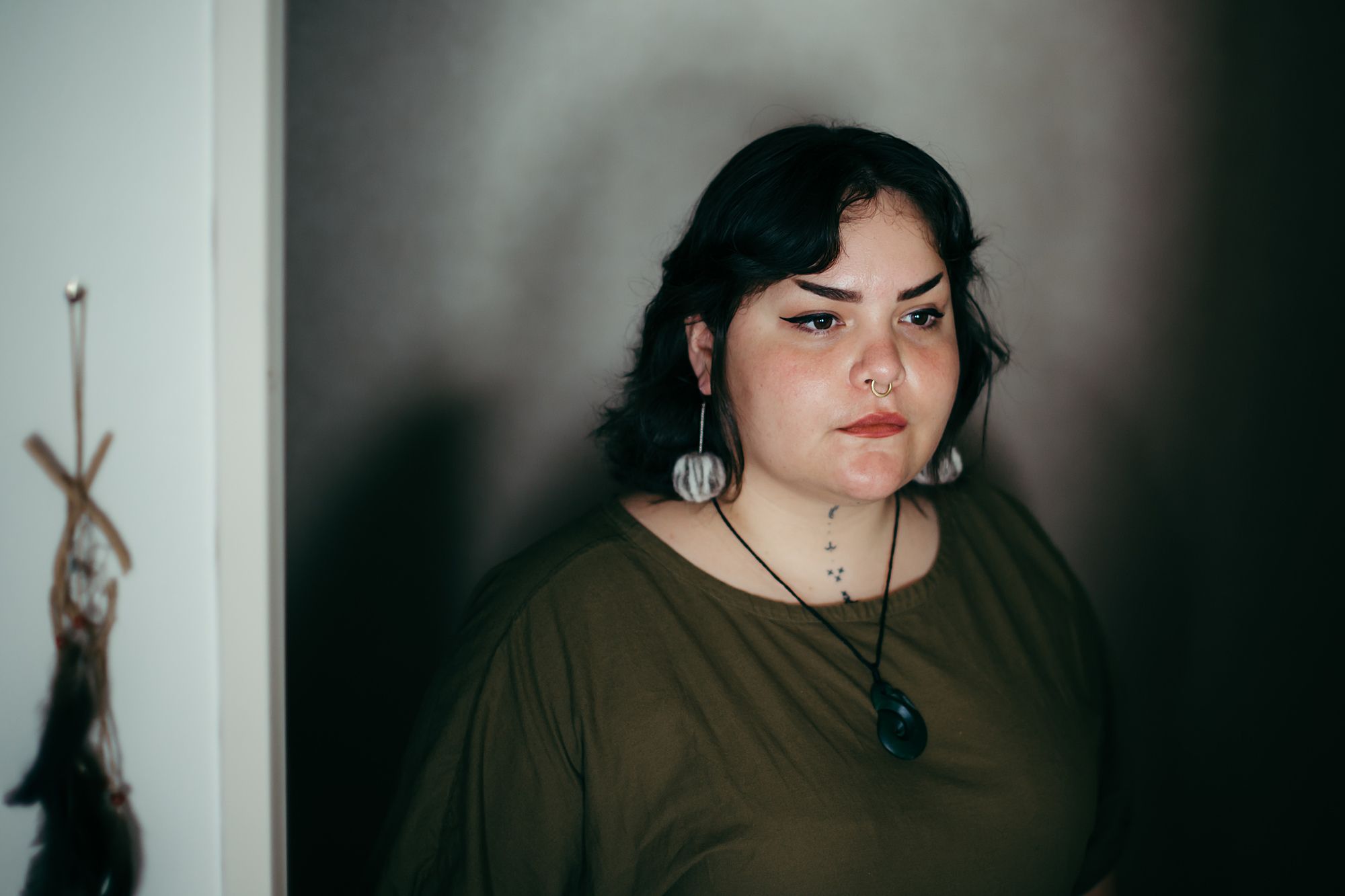Chill Girl Winter
Kōtuku Titihuia Nuttall explores the deep connection to winter within Māori and W̱SÁNEĆ cosmology, and the benefits of the cold for the girls that prefer to layer up instead of sweat off their makeup.
When I tell my psychologist that I’ve been feeling better, I really mean it. She is cautiously pleased and asks if I can imagine why that might be. We list the positive outcomes of our time together. New medication, engaging long-term goals, having someone to talk to, listening to my brain and body. For the first time in my life, I am looking forward, into the future, and imagining what kind of life I could have. I’m beginning to understand how many things are within my grasp, should I want them. The realisation lifts my heart and lightens my mood. At the end of our session, I mention the change in season. I think the wintertime suits me. I like having the darkness come so early. This surprises her – she usually hears about the adverse effects of less sunlight on her patients. Then she mentions the Danish concept of hygge, so we spend a moment expressing the positive changes the cold season brings, with an emphasis on self-care, slowing down and wellbeing. Winter sends all living things home, underground, back within themselves. It is only now that I begin to realise how deeply I crave the season changing and the return of the winter maiden.
Winter sends all living things home, underground, back within themselves.
As the earth crumbles into manmade catastrophe, the summers are getting hotter, longer and more unbearable. It barely rains through the holiday season and when it does there are small tornadoes and forked lightning, unusual storms and weather events. Fish are boiling and scorched in the oceans. Selfishly, I tend to dwell on the effects of the heat on myself. The depleted ozone layer makes it near impossible to be outside in the summer, which nonetheless remains party season. Even with the advent of a new plague, our friends leave home to visit small coastal towns, big cities, overseas. Gigs and concerts have well and truly started again. But I stay stuck inside, for more than one reason. Even when the sun finally settles beneath the horizon and I can go outside again, I am still depressed, like I have been for the better part of 15 years, which really dampens my enthusiasm for Hot Girl Summer.
every year, without fail, summer… kind of sucks.
As the Pākehā year ends, there are big expectations for what should happen in the hottest season of the year. And every year, without fail, summer… kind of sucks. My expectations are not realistic, informed mostly by Facetuned Instagram posts and thirst-trap TikToks. No, I am not frolicking at the beach every day, clear skinned and effortlessly sexy, with my very beautiful friends. I’m on the couch, suicidal, sweating, and ignoring messages from my very beautiful friends. The whole idea of summer is overrated. It all always feels like a lost opportunity. I don’t know if it is pop culture, or capitalism or what, but summer has always felt like the most important season, the time where things happen. Summer is for changing your life.
There’s immense pressure on the months of December, January and February. It feels you need to do a thousand things: find at least one new exciting lover, spend every day with your friends, work every possible shift to make/save money, visit friends, family (locally and abroad), go on road trips (see above), day drink (frequently), pick up new hobbies (multiple), transform yourself physically (hair, clothes, fluctuate weight, tan, new piercing? Tattoo?), transform yourself mentally (get smarter, read books everyone else has read, set goals for the new year, meditation?), transform yourself emotionally (break up/get back together, sleep with someone you shouldn’t, shopping addiction, light things that smell nice, daydream). But it isn’t until the wet and cold returns to Aotearoa that I begin to feel happier and more comfortable in my body. The night finally cools enough to sleep well, in the morning the air chills and dew forms. Hinetakurua has finally reappeared.
Illustration by the author
Tamanuiterā has two wives, each occupying their own portion of the sky, presiding over different aspects of Te Ao. As the longest day of the year comes to an end, the sun starts making his way back to Hinetakurua, his first wife, the winter maiden. Having spent the last six months with his wife Hineraumati, it is now time to return to Hinetakurua, the goddess who lives out on the ocean. She stays near the water, far from her metamour on land, in the realm of Tangaroa. She cares for the fish and sea creatures, supervises the pihirau (lamprey) on their journeys back to their freshwater breeding grounds from the ocean. She could be the star Sirius, bringing the cold weathers of winter. As Te Rā is finally back at her side, our days become shorter and shorter. Since I first learnt it recently, I have been turning her name over in my head, my reo so rudimentary I don’t know seasons or days most of the time. I had somehow heard of Hineraumati sometime before, though, which feels like a betrayal of her icy counterpart.
Hinetakurua intrigues me. She could be seen as harsh and unyielding. Her connection to slippery fish and sea creatures might not be the vibe for everyone. She heralds the first frosts and coldest weather, but I feel a connection to her nonetheless. To me, the summer asks for sacrifice. A long time ago summer was the season for war, which consumed the lives of many. Now, begrudgingly, I sacrifice my good outfits and cute makeup looks for Hineraumati. In their place she demands plain and airy dresses, dripping sweat, a clean face. It is not until winter arrives that I can layer, wear wool again, Peter Pan collars, stockings, boots.
To me, the summer asks for sacrifice.
The bulk of the year seems to take place in wintertime, the neoliberal Pākehā work and school year commands it so, leaving only the summer to recover from burnout. This means it takes until the middle of the year for things to start happening. This is when the year finally gains momentum. New ideas, relationships and projects begin to become real, substantial, fully fleshed. In my own life, winters have been miserable (especially in Te-Whanganui-a-Tara) but exciting. Opportunities and deadlines pile up and mix with house parties and mulled wine. Running home from the harbour in the rain or crouching under someone else’s jacket to smoke a joint on the deck at San Fran. Lighters refuse to catch. Uni kids bring hot-water bottles into lecture halls. Weather becomes an excuse to skip lectures or stay behind at the bar. It all seems romantic, upon reflection.
In the W̱SÁNEĆ calendar (the W̱SÁNEĆ nation from the southeast coast of Vancouver Island, where I whakapapa to, commonly Anglicised as ‘Saanich’), the winter season begins with the lunar month of SJELCASEN, the moon of putting your paddles away. As seafaring people, W̱SÁNEĆ spent the warm seasons travelling the oceans by canoe, visiting islands in the Salish Sea. The beginning of winter marked homecoming, putting away the arduous work of summer, and taking your place at the fire. In the last couple of years, I have spent more time thinking about W̱SÁNEĆ calendars and cosmology than those around me here in Aotearoa. There are plenty of reasons to look further afield for comforting Indigenous knowledge. I am both Māori and W̱SÁNEĆ, but I have now spent most of my life in Te-Ika-a-Māui. Connecting to my Coast Salish ancestry and culture is less complex for me right now. It takes place on my phone or computer. But when I engage with my Māoritanga beyond my family I am immediately lost and confused. When I think of changes in season, wonder about the winter maiden, I come first from an understanding of a W̱SÁNEĆ winter. It feels like a betrayal of the land I live on now, but it makes it easy for me to contextualise Hinetakurua.
Winter represents many of the most treasured parts of my life: spending time with family and loved ones, handicrafts such as weaving or carving, storytelling, rest, reflection and introspection. For the first time, I think about what winter is like in te ao Māori. What does winter mean to me as an urban Māori? What should I be doing? What should I be praying for? It takes an embarrassingly long time for me to remember one of the biggest celebrations in Māoridom occurs in winter: the rise of Matariki. My Māori grandmother never celebrated Matariki with us. I can’t even remember her mentioning it. She speaks Māori, but mostly to pray to Jesus, or cuss her husband out. Maybe I have it all wrong and should be watching for Puanga instead, as we descend from Taranaki. I have no way of knowing; as it is, my understanding of Matariki is limited. I have no idea how to spend the Māori New Year, I have no traditions to fall back on. This year, Matariki was a national holiday for the first time, something both exciting (to see ourselves and our culture reflected in media) and worrying (cue every company brownwashing themselves for June!). Either way, Māori New Year was very publicly celebrated across Aotearoa, which is wild.
What does winter mean to me as an urban Māori?
To me, it makes sense for the new year to begin with winter. Resolutions can be replaced with reconnection: to people, to land. With the sun setting so early and the frosts beginning, the night is longer than the day. Night needs to be spent inside next to the fire. Listening to the stories of those around you, whether old or new. Mending nets and blankets and clothes for the next year. Remaking or renewing tools to bring yourself greater success in the months to come. Sustaining yourself with the food you have put away for this time. It is a necessity to prepare for the future, for the cold months. And when those months arrive, it is a necessity to stay put where you are. To have a period of stillness and learning each year.
In these quiet periods it becomes easier to hear yourself think, to imagine what you will do when the warm sun returns. To reflect on what is left before you, whether you are on the path you want to be on. We must begin building up our traditions again, to survive a world that is actively trying to destroy us. What is the metaphorical paddle you need to put away for the next three months? How can you be kind to others around you? And yourself? What are your dreams and aspirations? And what is realistic to put yourself through? Who and what do you farewell when Matariki rises again?
We must begin building up our traditions again, to survive a world that is actively trying to destroy us.
I’m letting myself get excited. This is my New Year and I’m not hungover or bummed out. I’m manifesting the shit out of my future. I’m going to try and cook more. Stay on top of communication. Read and write amazing stuff. Yes, I’m still stuck inside, but this is an opportunity. The work I do in this time will blossom once springtime arrives. I’m thinking of now and the future, with Hinetakurua guiding me, just as she does the piharau.
This piece is featured as part of Issue 06: Vibe Shift, guest-edited by Tayi Tibble. Click here to read more essays in the series.


